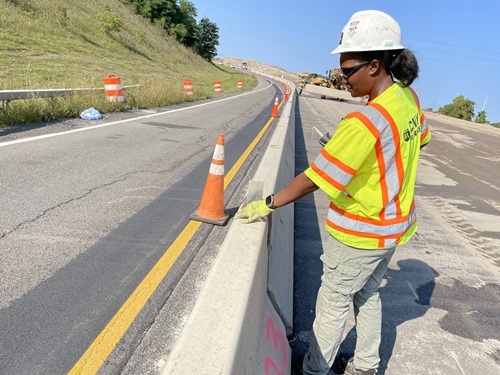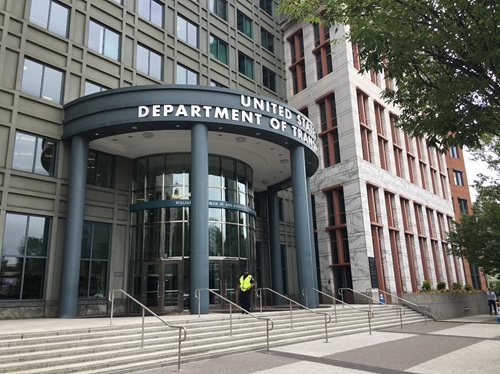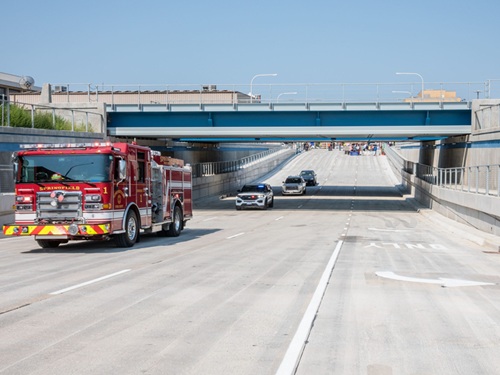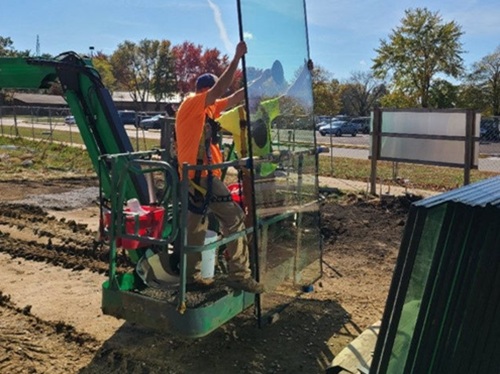The Federal Highway Administration recently issued $4.2 million in grants via its Highway Construction Training Program for 16 programs nationwide to help recruit, train, and place highway construction jobs.
[Above photo by Illinois DOT]
Funded via the Infrastructure Investment and Jobs Act of 2021, FHWA said its Highway Construction Training Program aims to fill critical shortages in highway construction, maintenance, and operations jobs needed to build and maintain the nation’s roads and bridges.

FHWA noted in a statement that those grants will fund a variety of highway construction-related job initiatives, such as helping hire heavy duty equipment operators, scholarships for pre-apprenticeship and apprenticeship programs, and programs to help job candidates obtain a commercial driver’s license or CDL.
Six state departments of transportation initiatives received grants from this round of disbursements from this FHWA program:
- The California Department of Transportation (Caltrans) received $259,245 to provide ironworker training for up to 20 individuals the first year with 75 percent to be placed for employment in the second year. The training program will help address a significant shortage of ironworkers in California. Caltrans said it will collaborate with the California prison industry, Iron Workers Local 118, and educational/trade schools across Northern and Southern California to administer Ironworker programs and enroll underserved and marginalized populations. The program will also provide supportive services such as childcare, transportation, employment physicals, and career development assistance – including resume writing and job placement services.
- The Illinois Department of Transportation received $288,000 to expand the existing Illinois Highway Construction Careers Training Program, which is currently offered by 10 community colleges statewide. Participants are trained in highway construction-related skills, including mathematics, job site readiness, carpentry, blueprint reading orientation, and forklift operation among other skills. The program will also be expanded to include a Materials Testing Program at South Suburban College in South Holland to recruit and train women, minorities, people with disabilities, veterans, and previously incarcerated individuals to become qualified highway construction professionals. Graduates will receive safety equipment and tools and assistance in applying for apprenticeships and positions with unions and highway contractors statewide.
- The New Mexico Department of Transportation (NMDOT) received $207,396 to create the Industry Credential Pipeline Program as an education pathway for K-12 education to post-secondary institution. The program will prepare individuals for high-demand roles with on-the-job learning and credentialing for jobs in the transportation industry. The NMDOT will partner with New Mexico Department of Workforce Solutions and the New Mexico Higher Education Department, to develop the training program and the credentialing program. NMDOT will also work with the Associated Contractors of New Mexico to provide classroom-based training and industry specific credentials.
- The New York State Department of Transportation received $300,000 for a workforce development initiative for the Kensington Expressway Project in Buffalo. NYSDOT will work with a wide range of partners including the Buffalo Educational Opportunity Center, the Independent Contractor’s Guild, Carpenters Local Union 276, Cahill Resources, Buffalo and Erie County Workforce Investment Board, and Mohawk Valley Community College. They all plan to work together to expand the existing program to provide additional training and employment opportunities to better address the highway industry workforce shortage in western New York. The program will provide opportunities for those residents that will be impacted by the NY State Route 33 Kensington Expressway Project and surrounding projects with an emphasis on recruiting women, minorities, and people with disabilities.
- The Washington State Department of Transportation (WSDOT) received $259,245 to support an on-the-job Training and Supportive Service’s Highway Construction and Maritime Trades Scholarships Program to address statewide shortage in apprentices. The program will focus on traditionally marginalized and low-income communities. The scholarship program will fund student pre-apprenticeship, apprenticeship, and academic training programs, including CDL programs, electrician training, diesel technician training, welding for ironwork, marine engineering technology and heavy equipment operator training. WSDOT is working closely with state colleges, trade schools, training programs, and several other partners to prepare individuals for jobs in highway engineering, construction contractors, municipalities, and other state government agencies as well.
- The Wisconsin Department of Transportation received $300,000to expand its Highway Construction Skills Training (HCST) into northern Wisconsin through the development of a Highway Construction Workforce Partnership (HCWP-North) workgroup. Workgroup members include the Bay Area Workforce Development Board, Northwest Wisconsin Workforce Investment Board, Forward Service Corporation, Lac Courte Oreilles Ojibwe University, Sokaogon Chippewa Community College, and Tribal Labor Advisory Committee. The HCWP-North will recruit, train, and place individuals in the highway construction workforce, supporting projects like the I-41 expansion, the I-535 Blatnik Bridge reconstruction project, and tribal workforce needs.
FHWA added that its Highway Construction Training Program originated in 2016 as a pilot program that brought together federal, state and industry partners to establish the HWCP Pilot Program.
The HCWP was later renamed the Strategic Workforce Development Initiative or SWD and selected as a focus program for FHWA’s 2021 and 2022 Every Day Counts (EDC)-6 program and adopted by 32 states. It was also carried over to EDC-7 and adopted by 43 states for 2023 and 2024.
The HCWP Pilot and SWD programs demonstrated the importance of providing job training and placement and support services, such as childcare and transportation, along with filling highway construction roles.
 Top Stories
Top Stories
AASHTO Provides USDOT Input on Funding Reauthorization
August 29, 2025 Top Stories
Top Stories

